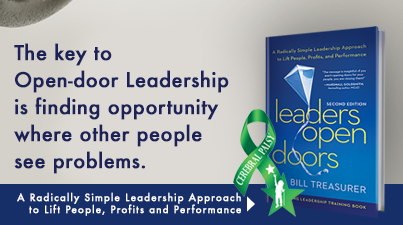Opportunities are the venues where people can try themselves, test themselves, better themselves, and even find themselves. The leader’s job is to match the opportunity to the person and to help the person, and the organization, exploit the opportunity for all it’s worth.
Being an open-door leader requires having an opportunity mindset, a significant shift from the more common threat-focused way of leading.
Fear and excitement prompt the same neurological responses. Think for a moment about what happens to you, physiologically, when you are really, really afraid. Your heart races, your palms sweat, your breath gets faster and shorter, and your stomach teems with butterflies. Well, guess what? Those same physiological responses happen when you are going to have sex!
If fear and excitement are both high-arousal states, why is fear so detrimental to creating opportunity while excitement is so effective?
Though there are almost no neurological and physiological differences, there is one critical distinction between the conditions of fear and excitement. You experience fear as displeasure, and you experience excitement as pleasure. It follows that you move toward situations that provide pleasure and you avoid situations that provoke displeasure.
Here are some specific impacts of keeping an opportunity focus:
- Opportunity Pulls: Leading by stoking people’s fears provokes anxiety and negative thoughts of impending painful consequences. But opportunities are hopeful situations that evoke positive thoughts of pleasurable rewards. Leadership is most effective when it moves people toward a desired outcome rather than getting them to run away from a bad outcome. Opportunity attracts; fear repels.
- Opportunity Points in the Right Direction: When you are talking about opportunities, you are talking about the conditions you want instead of the conditions you want to prevent from happening. Because outcomes often follow the direction of our thoughts, it’s best to focus on what you want vs. what you don’t. “Our opportunity is to keep the ball in the air” is better than “Whatever you do, don’t drop that ball!”
- Opportunity Activates Imagination: We “take advantage of” or “capitalize on” opportunities. They are conditions that don’t yet exist, and require people’s hard work and imagination to be fully exploited.
- Opportunity Inspires Courage: Opportunities are not sure things. The positive outcome you hope to create is not guaranteed. Thus opportunities come with potential risks. The risk is what infuses the pursuit of opportunities with pleasurable excitement.
- Opportunity Begets Opportunity: Would you rather have your employees coming to you with new ideas and opportunities they want you to support — or problems they want you to resolve? When you model opportunistic thinking, you increase the likelihood of building a self-sufficient, can-do spirit among employees.
Focusing on opportunity instead of problems is not just a matter of semantics. By viewing and explaining situations as opportunities, you create a field of excitement where employees are more apt to face challenges than shirk them.
Leaders create leaders by opening doors of opportunity that have a positive and lasting impact on the behavior of those they lead.



